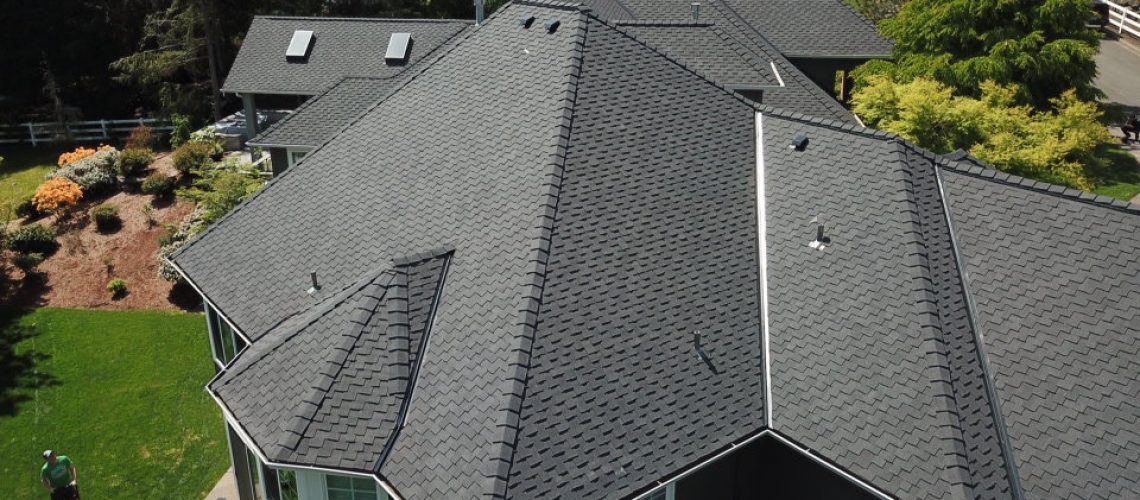Share this article
Share on facebook
Share on google
Share on twitter
Share on print
Share on email

When it comes to roofing materials, homeowners have several options to choose from. Some things to consider when selecting the roofing material for your home are your budget, how long you’re planning to keep your house and the weather in the area your home is located. Below you will find a brief description and the pros and cons of four of the main roofing materials used in the US: Asphalt shingles, metal roofing, wood shakes and concrete tiles.
Asphalt shingles: Asphalt shingles are the most common roofing materials in America, more than 70 percent of all single-family homes in the US are roofed with asphalt shingles because they’re effective in all environmental conditions. Upfront costs are lower than other materials, but you should expect to replace the shingles after about 20 years.
PROS: Good fire protection, look good on most home styles, many design and color options, most affordable, good wind rating, high-impact shingles available, easy and cost effective to repair.
CONS: Lifetime cost is higher than other materials because they must be replaced more often, rapid temperature changes can make shingles crack, mold or algae can be an issue on shingles in shady areas.
Metal roofing: Metal roofing comes in vertical panels or shingles resembling slate, tile and shake and lasts about 60 years or more. Metal excels at keeping heavy snow and rain off the roof, won’t burn and resists high winds.
PROS: Lasts 50 to 100 years, many metal roofing profiles have a Class A fire rating, metal reflects solar heat, so it can keep your home cooler and control energy costs in hot weather, easier installation than wood shakes or tile, new styles can mimic shingles, shakes, slate and tile and many colors are available.
CONS: Higher cost than asphalt shingles and wood roofing, noisier than other materials when the rain hits it, the material can dent when hit with a heavy object, expensive to repair.
Wood shingles and shakes: Wood roofs deliver a natural dose of beauty to any home. Cedar, redwood, cypress and pressure-treated pine shingles are available.
PROS: Natural beauty, cedar and redwood have oils that make them naturally resistant to moisture and insects, treated wood shingles have a Class A fire rating, wood shingles can last 5-10 years longer than asphalt, wood is recyclable.
CONS: Non-treated materials have a Class C fire rating, wood roofing is prohibited in some areas and some insurance companies will not insure homes with wood roofs, untreated wood is high maintenance – needs to be cleaned consistently to prevent the growth of algae or moss, installation is harder and it’s hard to find a good contractor that can install wood shakes, repairs are expensive when required.
Clay and concrete tiles: Clay and concrete roof tiles are good in warm, dry climates.
PROS: Tiles offer 50+ years of durability, resist fire and insects, the rich aesthetics of tile increase curb appeal, tiles are produced in a good range of colors, styles and textures, tiles are recyclable.
CONS: Heavier than most roofing material – might need extra framing support, the cost of tile is higher than asphalt, metal and wood, tiles may break if walked on and repairs are expensive.
Does my roof need to be replaced? | Should I repair or replace my roof? | How important is having a good roof? | Can I re-roof my house on my own? | Can I add a second layer of shingles to my roof? | How much does a new roof cost? | How much value does a new roof bring to your home? | What is the process for re-roofing my house? | What are the main components of a roofing system? | The importance of having a good roof deck & Do I need to install plywood over shiplap / tongue & groove decking? | Why is the roof underlayment so important? | How important are roof flashings and what are the different types? | Why is attic ventilation essential for a good roofing system? | What types of roofing materials are available and what are the pros and cons of each? | What are the top shingle manufacturers? | How important is the warranty of workmanship and materials? | How long does a new roof last? | How to maximize the life of your roof?
